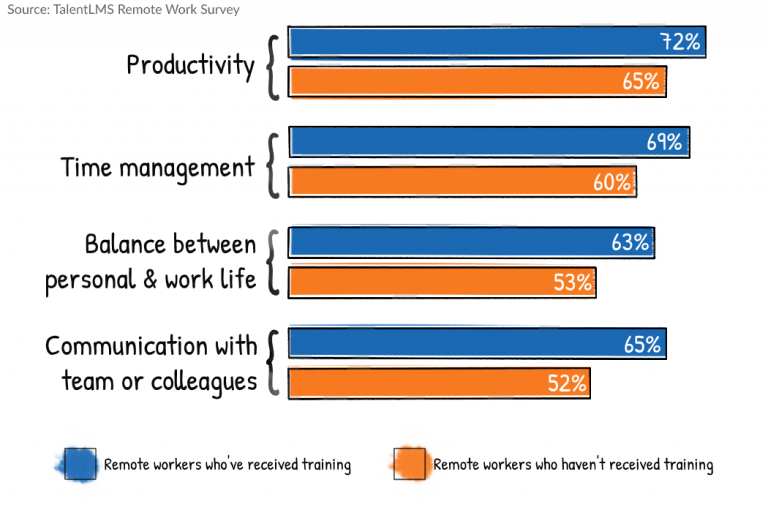If you’re putting together a remote team, you might be wondering what makes a good remote employee. Are there any skills or traits that make an employee suitable or unsuitable for a remote role?
Remote working and in-office working have quite different dynamics. When working remotely, you don’t get to see coworkers much and your collaboration is limited to online meetings, phone calls, texting, or asynchronous communications.
This has some serious ramifications. For one thing, remote employees might feel they’re on their own, and they might have some ideas to benefit from this false sense of freedom. So other priorities come into play and work is postponed.
All of this could be fine until it gets out of order in the hands of incompetent remote employees. And at the end of the day, you’re left with only billable hours and no satisfactory results. That’s why it’s wise to play it safe and look for some certain skills and traits in remote employee candidates before hiring them.
Let’s see some of the necessary skills and traits of remote employees.
Technology proficiency:
Remote work is technology-dependent. In order to perform well, remote employees should have access to the right tools such as PCs, cameras, high-speed internet connection, landline phones, etc. They should also have a good level of proficiency in the software systems that you’re using to accomplish tasks.
Needless to say, remote employees with low-level technological proficiency would be low performers, and might even cause hindrance to other people’s work. This makes technological proficiency a must-have qualification for remote employees.
Depending on the job role, technological proficiency may be limited to the use of office tools and applications like Microsoft Office Suite to access and create briefs, reports, and PowerPoint presentations.
But it may extend to the use of design tools and project management tools for workflow ease as well.
The proficiency level is key when determining an employee’s technological abilities. Based on the nature of the job to be done, a basic to intermediate level of proficiency in technological skills may be suitable for a particular job role.
However, many remote jobs may require expert-level proficiency for optimal performance. This is especially so because remote employees work without close supervision, and this reduces the chances of learning and improving these skills on the job.
Task prioritization and time management:
Keeping track of workload and delivering promptly on tasks are major challenges of remote work. This is because working from home poses a lot of distractions that can be avoided when working onsite, as can be seen in the Statista survey below.
(Source)
11% of remote workers, according to this survey, also report that they experience too many distractions at their home office. These distractions can affect productivity and impact the performance of the remote employee.
For this reason, prioritization of tasks and time management skills are important. A recent survey shows that most employees are only productive for 2 hours and 23 minutes in a workday. What this means for a diligent remote employee is that high-priority tasks should be scheduled within the timeframe when productivity is likely.
Furthermore, a remote employee should understand the use of time management tools to improve daily productivity. This makes it easier to keep track of tasks, set a priority list, and follow a pre-planned schedule.
Recruiters will be better off with remote employees who can manage and monitor their energy, cut down on distractions, and know how to prioritize and follow a routine. Also, having proficiency in project management, time management, and resource management software used by the company is a sure way of identifying a good fit in this regard.
Learning and Upskilling:
An employee who constantly upskills is a dream for any recruiter. This is the reason most human resource departments invest heavily in employee training and development.
For a remote worker, the competition in the industry requires constant improvement in skills to remain relevant to employees. A good thing about remote working is that workers can schedule their time in such a way that enables them to train at their convenience.
A remote employee with experiences and skills that indicate their personal proclivity for learning and upskilling can be very valuable to an evolving workplace. Statistics show that remote workers who receive training in core competence areas are more productive and effective with time management, team communication, and work-life balance.
(Source)
Remote employees should weigh their skills regularly and find ways to improve when necessary in order to match the evolving work practices and deliverables required in different industries. One of the 16 Amazon Leadership Principles is to hire and develop the best. This means that companies shouldn’t only set high standards, but also invest in development and look for potential.
Teamwork:
Remote working might seem like an isolated work setting. However, lots of communication is required to ensure a smooth and optimal operation of remote work. Research shows that remote employees spend 27% of their time collaborating, 6% of their time learning, and 5% of their time socializing.
The ability to work with a team and communicate effectively out of sight should be a key requirement for recruiters. A remote employee with poor communication skills and team collaboration skills can draw the entire team back and affect the productivity and performance of other members of the team.
Teamwork and communication in this regard involve how an employee is able to interpret tasks as well as accept and provide useful feedback promptly in a way that enables ease of understanding and flow of useful information. Knowing how to use online collaboration tools for optimal communication and teamwork is a necessity for remote employees.
Caring, respectful, and trustworthy:
The performance of a team can be tied to the work culture that team members are exposed to. Employees are 10.4 times more likely to resign from a job as a result of a toxic work culture.
To avoid the tension that can arise from an unhealthy work culture, employers try to establish a conducive work culture that can be interpreted as a caring, respectful, and trustworthy attitude among employees.
Remote work makes it less likely to access a colleague’s mental or physical state – this is why remote team members should be more intentional in expressing care to colleagues and providing help to one another when needed.
This also extends to respect for one another in terms of communication and individual differences to avoid tension and toxicity within the team.
Even more, trust is required between remote employees and employers as well as their colleagues. Remote workers cannot be physically accessed during working hours to ensure they are performing, but it is important for recruiters to be assured of the ability of the employee to deliver on tasks assigned to them.
This trust enables other team members to fully carry on their duties without any fear of unexpected delays or irregularities with tasks from fellow team members.
Results-driven:
In a remote work environment, results are more important than filling in work hours. Remote workers may not work within daily work hours as they are not under obvious surveillance like on-site workers. However, their performance on the job is determined by the results they are able to deliver.
As Cal Newport writes for TheNewYorker:
“Moving our professional efforts away from in-person surveillance and toward results not only makes remote work sustainable—it can also change the very nature of our jobs into something more enjoyable, and productive, and in tune with the unequal and unpredictable demands of life.
Recruiters need to look out for result-driven remote workers through their performance records to ensure they get the most productivity out of the remote work environment arrangement.“
The bottomline:
Whether or not remote work is suitable for your business is a matter of preference. There are lots of successful companies that rely solely on remote employees with different roles from sales reps to project managers. So there’s no way to argue that remote work is inherently faulty or inadequate.
What’s certain though is the importance of employees competence when working remotely. Do they have certain skills and traits necessary to manage working from home? In particular:
- Are they proficient at using the technology required for the job?
- Can they prioritize tasks and manage their time?
- Are they good at learning and upskilling?
- Can they manage collaborating with other team members?
- Are they respectful of differences, caring, and trustworthy?
- Are they conscientious and could they be trusted?







Leave A Comment